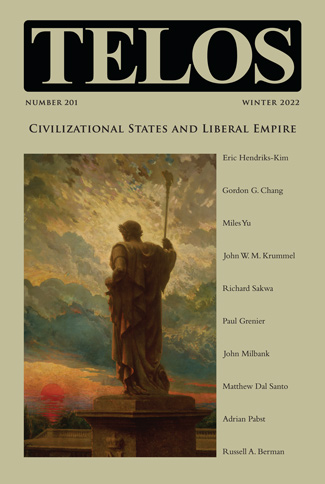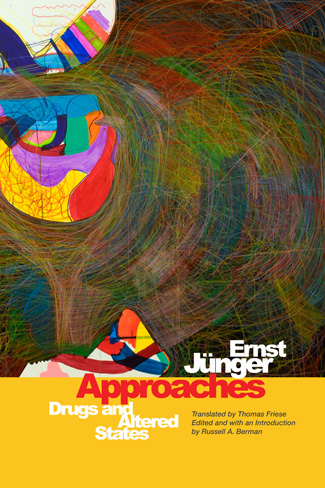In today’s episode of the Telos Press Podcast, David Pan talks with Michael Hüther about his article “Tired of Science?! Notes on the Relationship between University and Society,” from Telos 200 (Fall 2022). An excerpt of the article appears here. In their conversation they discuss what has become problematic in the relationship between science and truth and the relationship between science and values; how we should understand the role of myth in human society and why it continues to be important; how moralization responds to the dissatisfaction with science and the continuing relevance of myth; the dangers of moralization for the university; the driving forces behind the economization of the university as well as the consequences of this economization; how the German constitution establishes the social and political roles of the university; and how the university fulfills these roles today. If your university has an online subscription to Telos, you can read the full article at the Telos Online website. For non-subscribers, learn how your university can begin a subscription to Telos at our library recommendation page. Print copies of Telos 200 are available for purchase in our online store.
|
In today’s episode of the Telos Press Podcast, David Pan talks with Greg Melleuish and Susanna Rizzo about their article “Universities: Truth, Reason, or Emotion?” from Telos 200 (Fall 2022). An excerpt of the article appears here. If your university has an online subscription to Telos, you can read the full article at the Telos Online website. For non-subscribers, learn how your university can begin a subscription to Telos at our library recommendation page. Print copies of Telos 200 are available for purchase in our online store. Telos 201 (Winter 2022): Civilizational States and Liberal Empire is now available for purchase in our store. Individual subscriptions to Telos are also available in both print and online formats.
When we consider the way in which power functions on a global level, it will also be crucial to understand how a world order will reflect a particular way of structuring the relationship between values and power. Even the seemingly most egregious use of power can only take place within the framework of an attempt to realize values in the world, and realist accounts of global order must also recognize the importance of some ideology such as nationalism as a means of establishing political values. Accordingly, discussions of balance-of-power dynamics can only begin once great powers emerge as a consequence of the political will of certain peoples to understand themselves in a certain way. Based on such measures as GDP, population, and military spending, Russia does not rank particularly well in relation to countries such as Brazil and India, neither of which pretends to great power status. If Russia can be considered a great power today, it is primarily because of the goals and values that its government embodies. Values form the foundations of global order, and Russia only continues to project its power because it maintains a sense of the global reach of its values for determining order for others.
Jünger stands out in this counterculture company with his thoroughly different background. As a teenager, he ran away from his German home to join the French Foreign Legion. In the First World War he was wounded multiple times and became a highly decorated officer in the Kaiser’s army. He would serve again on the German side in the Second World War—even though he published a famous anti-Hitler novel. Yet alongside that military career, Jünger spent a lifetime with consciousness-enhancing experiments—hashish, cocaine, and morphine until he worked his way to LSD, psilocybin, and peyote. Jünger invites us to follow him on that mind-blowing path in an autobiography of his life with drugs: Approaches: Drugs and Altered States. This wide-ranging account documents an array of drug experiences, placing them in a richly intellectual context of cultural transformations and the literary history of drug use—Baudelaire, De Quincey, and Huxley—as well as art historical reflections on hallucinatory elements in Van Gogh, cubism, and surrealism. A great intellect meets psychedelics. The following comments refer to Robert Redeker’s piece from Le Figaro on December 30, 2022, published in English translation on TelosScope here. In a notable comment in The Interpretation of Dreams, Sigmund Freud compares Oedipus Rex with Hamlet in order to describe what he calls “the secular advance of repression in the emotional life of mankind.” Between Sophocles and Shakespeare, civilization underwent an enormous increase in the control of affect and a withering away of the formerly unmanaged space of some original freedom. Of course Freud was talking about widely separated historical moments, ancient Greece and Elizabethan England. Today, through hyper-acceleration in a much shorter period, we are undergoing a comparable quantum leap of control (see: surveillance) accompanied by restrictions on free speech and free thought unthinkable only a few decades ago. The following text originally appeared in Le Figaro on December 30, 2022, and is published here in English translation with permission of the author. Translated by Russell A. Berman, whose comments are here. In 1793, the great German philosopher Johann Gottlieb Fichte discovered what the rector of the Great Mosque of Paris does not know today, if one can judge by the complaint that he filed against the author Michel Houellebecq, i.e., that freedom of thought is divine. Let us listen to Fichte: “It is both a human and divine truth that man has inalienable rights and that freedom of thought is one of these rights.” What does that mean? It means that denouncing and opposing freedom of thought is blasphemous; that this sort of anger simultaneously offends the divine part of humanity and, indirectly, God himself; and that this sort of attack is dehumanizing because it attempts to tear out of the human conscience what God himself gave it. Through its legal action, the Grand Mosque of Paris poses two risks, for the writer and our country: the risk of forcing the writer, a candidate for the Nobel Prize, to live under close police protection or, in other words, to become a sort of prisoner of conscience in his own country, and the risk of inciting a fanatic ready to spill the blood of the man targeted as an “Islamophobe.” Let us recall that since Islam is not the state religion of France, one has the right to speculate, perhaps erroneously, that it is wrong and alien to the soul of French civilization. One similarly has the right to discuss this idea, as long as one stays at the level of general ideas and refrains from defamations or direct calls for violence. |
||||
|
Telos Press Publishing · PO Box 811 · Candor, NY 13743 · Phone: 212-228-6479 Privacy Policy · Data Protection Copyright © 2025 Telos Press Publishing · All Rights Reserved |
||||




